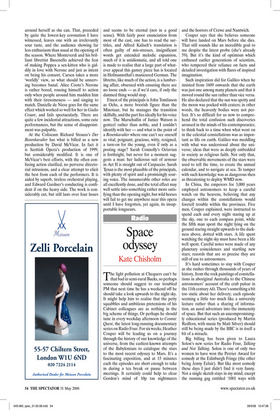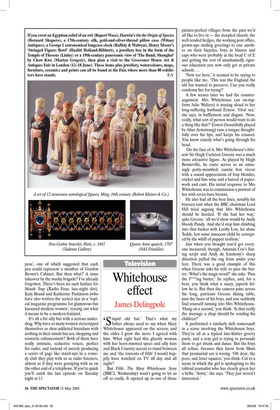Space odyssey
Kate Chisholm
The light pollution at Chequers can’t be that bad in semi-rural Bucks, so perhaps someone should suggest to our troubled PM that next time he has a weekend off he should take a look upwards to the night sky. It might help him to realise that the petty squabbles and ambitious pretensions of his Cabinet colleagues are as nothing in the big scheme of things. Or perhaps he should tune in every weekday afternoon to Cosmic Quest, the latest long-running documentary series on Radio Four. For six weeks, Heather Couper will be leading us on a journey through the history of our knowledge of the universe, from the earliest-known attempts of the Babylonians to catalogue the stars to the most recent odyssey to Mars. It’s a fascinating exposition, and at 15 minutes each the episodes are short enough to take in during a tea break or pause between meetings. It certainly could help to clear Gordon’s mind of 10p tax nightmares and the horrors of Crewe and Nantwich.
Couper says that she believes someone will have landed on Mars before she dies. That still sounds like an incredible goal to me despite the latest probe (she’s already 59). But it’s the kind of optimism which enthused earlier generations of scientists, who tempered their reliance on facts and detailed investigation with flares of inspired imagination.
Such inspiration did for Galileo when he insisted from 1609 onwards that the earth was just one among many planets and that it moved round the sun rather than vice versa. He also declared that the sun was spotty and the moon was pocked with craters; in other words, the heavenly bodies were not perfect. It’s so difficult for us now to comprehend the total confusion such discoveries aroused in the minds of his contemporaries; to think back to a time when what went on in the celestial constellations was as important as life on earth. Galileo was meddling with what was understood about the universe; ideas that were as deeply embedded in society as religious faith. Not only that, the observable movements of the stars were used to tell the time, to create the annual calendar, and to navigate at sea. To tamper with such knowledge was as dangerous then as threatening to deploy WMD now.
In China, the emperors for 3,000 years employed astronomers to keep a careful watch on the heavens, believing that any changes within the constellations would foretell trouble within the provinces. Five men, Couper explained, were instructed to spend each and every night staring up at the sky, one to each compass point, while the fifth man spent the night lying on the ground staring straight upwards to the darkness above, dotted with stars. A life spent watching the night sky must have been a life well spent. Careful notes were made of any planetary coincidences and startling new stars; records that are so precise they are still of use to astronomers.
It’s hard sometimes to stay with Couper as she rushes through thousands of years of history, from the rock paintings of constellations in aboriginal Australia to the Chinese astronomers’ account of the crab pulsar in the 11th century AD. There’s something a bit too static about her delivery; each episode seeming a little too much like a university lecture rather than a sharing of information, an aural adventure into the immensity of space. But that such an uncompromisingly educational series (produced by Martin Redfern, with music by Matt Silver) should still be being made by the BBC is in itself a bit of a miracle.
Big billing has been given to Laura Solon’s new series for Radio Four, Talking and Not Talking. Solon is one of only two women to have won the Perrier Award for comedy at the Edinburgh Fringe (the other being Jenny Eclair). But like most comedy these days I just didn’t find it very funny. Not a single sketch stays in my mind, except the running gag entitled ‘1001 ways with peas’, one of which suggested that each pea could represent a member of Gordon Brown’s Cabinet. But then what? A mass takeover by the mushy brigade? I’ve already forgotten. There’s been no such fanfare for Mouth Trap (Radio Four, late-night slot). Katy Brand and Katherine Parkinson (who have also written the series) star in a ‘topical magazine programme for glamorous but harassed modern women’, teasing out what it means to be a modern feminist.
It’s all a bit silly but with a serious underdrag. Why have so many women stereotyped themselves as shoe-addicted harridans with nothing in their minds but sex, shopping and cosmetic enhancement? Both of them have really intimate, seductive voices, perfect for radio, and instead of merely producing a series of gags like stand-ups in a comedy club they play with us as radio listeners, almost as if they were gossiping with us on the other end of a telephone. If you’re quick you’ll catch the last episode on Tuesday night at 11.











































































 Previous page
Previous page